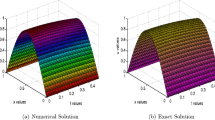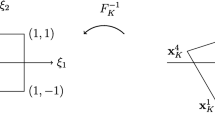Abstract
We describe an adaptive mesh refinement finite element method-of-lines procedure for solving one-dimensional parabolic partial differential equations. Solutions are calculated using Galerkin's method with a piecewise hierarchical polynomial basis in space and singly implicit Runge-Kutta (SIRK) methods in time. A modified SIRK formulation eliminates a linear systems solution that is required by the traditional SIRK formulation and leads to a new reduced-order interpolation formula. Stability and temporal error estimation techniques allow acceptance of approximate solutions at intermediate stages, yielding increased efficiency when solving partial differential equations. A priori energy estimates of the local discretization error are obtained for a nonlinear scalar problem. A posteriori estimates of local spatial discretization errors, obtained by order variation, are used with the a priori error estimates to control the adaptive mesh refinement strategy. Computational results suggest convergence of the a posteriori error estimate to the exact discretization error and verify the utility of the adaptive technique.
Similar content being viewed by others
References
S. Adjerid and J. E. Flaherty,A moving-mesh finite element method with local refinement for parabolic partial differential equations, Comp. Meths. Appl. Mech. and Engrng., 55 (1986), 3–26.
S. Adjerid, J. E. Flaherty and Y. J. Wang,A posteriori error estimation with finite element methods of lines for one-dimensional parabolic systems, Tech. Report 91-1 Department of Computer Science, Rensselaer Polytechnic Institute, Troy, 1991.
S. Adjerid, J. E. Flaherty, P. K. Moore and Y. J. Wang,Higher-order adaptive methods for parabolic systems, Physica D, to appear, 1992.
S. Adjerid, J. E. Flaherty and Y. Wang,HPR adaptive finite element methods for one-dimensional parabolic systems, in preparation, 1992.
M. J. Baines and A. J. Wathen,Moving finite element methods for evolutionary problems, I. theory, J. Comp. Phys., 79 (1988), 245–269.
R. E. Bank,The efficient implementation of local mesh refinement algorithms, inAdaptive Computational Methods for Partial Differential Equations (I. Babuska, J. Chandra, J. E. Flaherty, eds.) SIAM, Philadelphia, 1983, 74–81.
M. Bieterman and I. Babuska,The finite element method for parabolic equations, II a posteriori error estimation and adaptive approach, Numer. Math., 40 (1982), 373–406.
K. Burrage,A special family of Runge-Kutta methods for solving stiff differential equations, BIT, 18 (1978), 22–41.
K. Burrage, J. C. Butcher and F. H. Chipman,An implementation of singly-implicit Runge-Kutta methods, BIT, 20 (1980), 327–340.
J. C. Butcher,A transformed implicit Runge-Kutta method, J. A.C.M., 26 (1979) 731–738.
K. Dekker and J. G. Verwer,Stability of Runge-Kutta Methods for Stiff Nonlinear Differential Equations, Elsevier Science, Amsterdam, 1984.
J. E. Flaherty and P. K. Moore,High-order adaptive hp-refinement methods for parabolic systems, in preparation, 1992.
E. Hairer, S. P. Nørsett and G. Wanner,Solving Ordinary Differential Equations I Nonstiff Problems, Springer-Verlag, Berlin, 1987.
E. Hairer and G. Wanner,Solving Ordinary Differential Equations II Stiff and Differential-Algebraic Problems, Springer-Verlag, Berlin, 1991.
I. W. Johnson, M. J. Baines and A. J. Wathen,Moving finite element methods for evolutionary problems, II. Applications, J. Comp. Phys., 79 (1988), 270–296.
A. Kapila,Asymptotic Treatment of Chemically Reacting Systems, Pitman Advanced Publishing Program, Boston, 1983.
S. Keeling,Galerkin/Runge-Kutta discretizations for semilinear parabolic equations, SIAM J. Numer. Anal., 27 (1990), 394–418.
J. Lawson, M. Berzins and P. M. Dew,Balancing space and time errors in the method of lines, SIAM J. Sci. Stat. Comput., 12 (1991), 573–594.
P. K. Moore and J. E. Flaherty,A local refinement finite element method for one-dimensional parabolic systems, SIAM J. Numer. Anal. 27 (1990), 1422–1444.
P. K. Moore and J. E. Flaherty,High order adaptive solutions of parabolic equations I. singly implicit Runge-Kutta methods and error estimation, Tech. Report 91-12, Department of Computer Science, Rensselaer Polytechnic Institute, Troy, 1991.
P. K. Moore,A posteriori error estimation with finite element semi-and fully-discrete methods for nonlinear parabolic equations in one space dimension, submitted for publication, 1991.
S. P. Nørsett and H. H. Simonsen,Aspects of parallel Runge-Kutta methods, inNumerical Methods for Ordinary Equations (A. Bellin, C. W. Gear, E. Russo, eds.), Springer-Verlag, Berlin, (1989), 103–117.
B. Szabo and I. Babuska,Introduction to Finite Element Analysis, John Wiley and Sons, New York, 1991.
V. Thomée,Galerkin Finite Element Methods for Parabolic Problems, Springer-Verlag, Berlin, 1984.
Author information
Authors and Affiliations
Additional information
This research was partially supported by the U.S. Air Force Office of Scientific Research, Air Force Systems Command, USAF, under Grant Number AFOSR-90-0194; the U.S. Army Research Office under Contract Number DAAL 03-91-G-0215; by the National Science Foundation under Grant Number CDA-8805910; and by a grant from the Committee on Research, Tulane University.
Rights and permissions
About this article
Cite this article
Moore, P.K., Flaherty, J.E. High-order adaptive finite element-singly implicit Runge-Kutta methods for parabolic differential equations. BIT 33, 309–331 (1993). https://doi.org/10.1007/BF01989753
Received:
Revised:
Issue Date:
DOI: https://doi.org/10.1007/BF01989753




